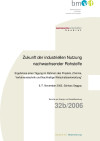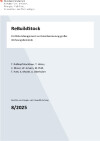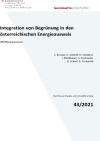Suchergebnisse für "Factsheet: Energietechnologien gestalten, die für alle sinnvoll und nutzbar sind"
DREI x NULL = NULL - Research project on climate-neutral construction in all life cycle phases based on three demonstration buildings
The aim of the F&E project is the realization of three different residential buildings, which are all climate-neutral in the life cycle phases of construction, operation and dismantling. The aim is to create exemplary showcase projects for the future residential construction sector.
Zukunft der industriellen Nutzungnachwachsender Rohstoffe

Ergebnisse einer Tagung im Rahmen des Projekts "Chemie,
Verfahrenstechnik und Nachhaltige Wirtschaftsentwicklung". 6./7. November 2003, Schloss Seggau
Schriftenreihe
32b/2006
Herausgeber: BMVIT
Deutsch, 265 Seiten
Downloads zur Publikation
Themenworkshop Fassaden der Zukunft
Der nächste "Haus der Zukunft" Themenworkshop wird am 31. März 2011 in Graz stattfinden und ist dem Thema "Fassaden" gewidmet.
IEA SHC Task 50 Newsletter 1
Der erste Newsletter enthält allgemeine Informationen, Hintergründe und Ziele des IEA SHC Task 50 weiters werden aktuelle Ergebnisse aus dem Task vorgestellt.
Foto-Webtagebuch S-House in Böheimkirchen
Ein zweigeschossiges Passivhaus als Büro- und Ausstellungsgebäude in Holz-Strohballenbauweise unter vorwiegendem Einsatz regionaler Nachwachsender Rohstoffe wurde vor kurzem in Böheimkirchen fertiggestellt.
Transnationale Ausschreibung "ERA-NET Cofund Urban Accessibility and Connectivity"
Gesucht werden mobilitätsrelevante Forschungsvorhaben sowohl zu personen- als auch zu gütermobilitätsrelevanten Herausforderungen im urbanen Kontext. Einreichschluss: 17. März 2020.
Conference: Smart Grids Week - Salzburg 2013
13th to 17th of May 2013
Salzburg Congress and Salzburg AG5020 Salzburg, AT
The Smart Grids Week - Salzburg 2013 aims to significantly contribute to the further development of electricity infrastructures.
Fachgespräch Bioenergieforschung 2014
21. November 2014
BMVIT, Radetzkystraße 2Wien, AT
Berichte der österreichischen Delegierten zu aktuellen Entwicklungen in den Tasks des IEA Implementing Agreements "Bioenergy" sowie Input durch Vertreter der Industrie.
ReBuildStock - Portfolio-Management zur Dekarbonisierung großer Wohnungsbestände

Portfolio-Managementmethode zur Unterstützung der Entscheidungsprozesse von Eigentümer:innen größerer Wohnungsbestände bei der Erarbeitung von Strategien zur schnellen und sozialverträglichen Dekarbonisierung ihrer Gebäudebestände.
Schriftenreihe
8/2025
T. Roßkopf-Nachbaur, T. Weiss, C. Moser, W. Amann, M. Ploß, T. Hatt, A. Mundt, A. Oberhuber
Herausgeber: BMK
Deutsch, 115 Seiten
Downloads zur Publikation
IEA-SHC Task 47 Positionspaper
Das Position Paper zu IEA Solar Heating and Cooling-Task 47 "Nachhaltige Sanierung von Dienstleistungsgebäuden" ist veröffentlicht und steht zum Download zur Verfügung.
Erster Newsletter des D-A-CH-Algen-Netzwerks erschienen
Das „D-A-CH Netzwerk Algen" fördert den Informationsaustausch zwischen Wirtschaft, Wissenschaft und Forschungsförderung der deutschsprachigen Länder. Nun wurde der erste Newsletter veröffentlicht.
Lahof/Lanserhofsiedlung - Path to Zero CO2 - climate-neutral demonstration building in relation to the neighbourhood
The aim is to develop and implement an innovative, climate-neutral neighbourhood concept with various sustainable energy and building technology components. A central element here is the climate-neutral demonstration building in timber construction. This building is equipped with thermal component activation in solid wood and combines innovative energy concepts such as wastewater heat recovery, large photovoltaic systems and a hydrogen system for seasonal energy storage.
IEA PVPS Task 1: Snapshot of Global PV Markets 2018 Edition (1992-2017)

Der Snapshot Report 2017 gibt Einblicke über globale Photovoltaik-, Markt- und Technologieentwicklungen, sowie wichtige Änderungen in den nationalen politischen Rahmenbedingungen des vergangenen Jahres.
Herausgeber: IEA PVPS, Task 1, Edition 2018
Englisch, 16 Seiten
Downloads zur Publikation
Umsetzungsplan zur Energieforschungsinitiative
Der Umsetzungsplan zur Energieforschungsinitiative im Nationalen Energie- und Klimaplan wurde vom BMK gemeinsam mit österreichischen Innovationsakteuren erarbeitet. Er beinhaltet Missionen, Innovationsziele sowie konkrete Aktivitäten.
Integration von Begrünung in den österreichischen Energieausweis (GREENergieausweis)

Anpassung der Berechnungsmodelle im Energieausweis derart, dass Gebäudebegrünung darin möglichst realistisch abgebildet werden kann und Abschätzung zur Akzeptanz einer Umsetzung bei relevanten Stakeholdern.
Schriftenreihe
43/2021
C. Kresser, E. Schriefl, H. Schöberl, I. Mühlbauer, S. Formanek, B. Scharf, G. Frühwirth
Herausgeber: BMK
Deutsch, 71 Seiten
Downloads zur Publikation
MaBo - material saving in bored piles - a contribution to reducing CO2-emissions in the construction industry
Development of an innovative method for saving material in bored piles in order to reduce CO2 emissions in the construction industry. By optimizing the construction methods and using alternative materials, the sustainability of the foundation bodies is to be improved.
FavoriteFlows – Innovative solutions for water and energy cycles in buildings for a climate fit city
Demonstration of detailed planning work and implementation of water cycles (building-integrated constructed wetland wastewater treatment) and energy cycles (wastewater heat exchanger) on a large residential apartment development for climate resilience, resource efficiency and high living standard.
ÖGUT-Umweltpreis 2016 - Kategorie „Stadt der Zukunft“: noch bis 30. September einreichen
Mit Unterstützung des BMVIT werden in der Kategorie "Stadt der Zukunft“ VordenkerInnen aus der Industrie- und Energiezukunft gesucht. Einreichschluss ist der 30. September 2016.
Climate Quarter Melk
Radical and comprehensive transformation of a city quarter in the small town of Melk, Lower Austria, involving the areas of urban planning, landscape architecture, traffic planning and co-creation - demonstrated by the implementation and rededication of a parking lot to an urban, inner-city climate forest within project life-time.
Informationsveranstaltung zu aktuellen Ausschreibungen
Am 18. Mai 2005 in Salzburg, am 19. Mai 2005 in Dornbirn, am 30. Mai 2005 in Graz und am 31. Mai 2005 in Wien.
